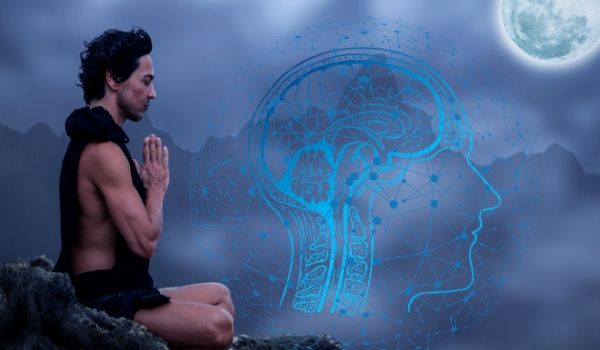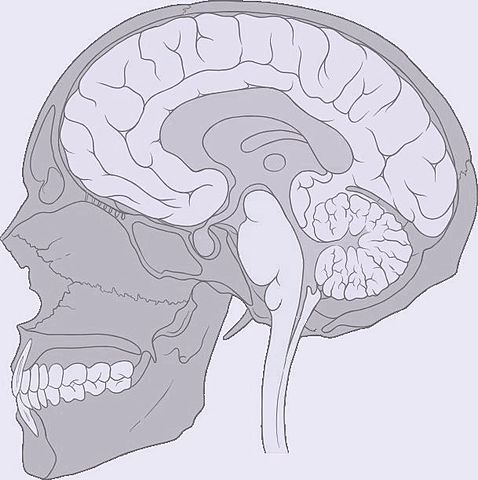Last updated on April 26th, 2025 at 11:20 am

Yoga has a positive effect on our mental health and it can even change brain anatomy & function for better, finds a recent study.
A recent study published online on Brain Plasticity 1 reveals that yoga can affect brain health and function and can help improve our mental health.
As the study also reveals the effect of yoga in the anatomy of the brain, it would be interesting to learn more about this research. So, let’s get started.
Table of Contents
Yoga and mental health
Yoga is an ancient Indian religious practice that involves unification of mind and body.
However, in the present cultural context, it is mainly adopted by people for its mental and physical relaxation effect. It involves physical posture (asanas), breathing exercises (pranayama) and meditation.
There are many previous research that back up its positive physical effects on health, such as lowering blood sugar levels in diabetes, control of high BP and many types of musculoskeletal illnesses. Research also supports its positive effect on mental health, like stress, anxiety, and depression.
But, researchers were curious about whether it has an effect on the structure and function of the brain. The present study tries to answer this question.
The study may benefit the elderly person susceptible to mental illness, such as Alzheimer’s and dementia. This research is in line with another previous research “Healthy lifestyle can reduce risk of dementia, finds study“.
Research methodology
Researchers selected 11 different research papers published between 2009 to July 2019 that examine the effect of yoga on brain health and also had. All the studies were conducted on the adult population.
They shortlisted the studies such that it includes brain health measures assessed using magnetic resonance imaging (MRI), including functional MRI (fMRI) or single-photon emission computed tomography scan (SPECT) or position emission tomography (PET).
They included data from these journals:
- MEDLINE,
- PsychINFO,
- PubMed,
- Indian Council of Medical Research, and
- Cochrane.
All the 11 studies were categorized based on the outcome variables measured, into two groups:
- Effects of Yoga Practice on Brain Structure: That describes the structural characteristics of the brain associated with yoga practice, and
- Effects of Yoga Practice on Brain Function: That describes investigations of regions showing differential activation or connectivity in the context of yoga practice.
All the data were then explored and reviewed by researchers to conclude the final result.
Result
Researchers found that yoga exhibited both the structural and functional on positive effects on our brain.
Effects of yoga practice on brain structure

In order to identify the effects of yoga practice on brain structure, researchers have utilized MRI to investigate how the structure of the brain differs among those with experience practicing yoga.
The MRI visuals clearly demonstrated the difference between a yoga practitioner and non-yoga practitioners. Yoga practitioners exhibited greater cortical thickness, gray matter (GM) volume, and GM density than non-practitioners in a variety of regions.
We found the volume of the left hippocampus to be significantly greater among yoga-practitioners compared to age- and sex-matched controls with similar physical activity and fitness levels.
A number of additional frontal (bilateral orbital frontal, right middle frontal, and left precentral gyri), temporal (left superior temporal gyrus), limbic (left parahippocampal gyrus, hippocampus, and insula), occipital (right lingual gyrus), and cerebellar regions were also larger among yoga-practitioners than non-practitioners.
Among yoga-practitioners, a positive relationship between the years of yoga practice and GM volume was also observed in a number of areas.
Effect on brain function
Differences in brain function between yoga-practitioners and non-practitioners have been observed in the dorsolateral prefrontal cortex, with yoga-practitioners showing less activation during both working memory and affective Stroop tasks.
Additionally, yoga-practitioners differed from non-practitioners within the ventrolateral prefrontal cortex, superior frontal gyrus, and amygdala during other aspects of the affective Stroop task.
Studies investigating changes in the functional connectivity of the brain following yoga practice have primarily identified increases in the default mode network, one of which found that those changes were related to memory performance.
Also read: Depression Eases by Consuming Dark Chocolate finds study.
What does it mean for us
Though we may integrate yoga into our health practice for better stress, anxiety and depression management, scientists are positive about its healing effect on age-related mental health issues such as Alzheimer’s and dementia. Interestingly, yet another study finds that Alzheimer’s affects more women than men.
Science already knew about the positive effects of aerobics in such age-related ailment, but with age (or disability), performing exercises becomes a challenge.
In such conditions, yoga holds promise in the future for disabled and seniors to mitigate age-related and neurodegenerative declines.
Keep Reading: Poor Sexual Health in Men Linked to Memory Loss | Study
Reference Journal:
Available from:
The author is a physiotherapist who has been practising for the last 17 years. He holds a Bachelor's in Physiotherapy (BPT) from SVNIRTAR (Swami Vivekananda National Institute of Rehabilitation and Research), one of the prestigious physiotherapy schools in India.
Whatever he learns dealing with his patient, he shares it with the world through blogs and e-books. He also owns a YouTube channel, "Sunit Physiotherapist" with over 8 lakh active subscribers. Here, he shares everything he gets to learn serving the patient.






These yoga steps have a positive effect on mental health like stress, anxiety, and depression. Thanks for writing this blog. very helpful.